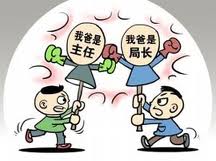The Word of the Week comes from China Digital Space’s Grass-Mud Horse Lexicon, a glossary of terms created by Chinese netizens and frequently encountered in online political discussions. These are the words of China’s online “resistance discourse,” used to mock and subvert the official language around censorship and political correctness.
This term is a product of the growing disparity between the rich and poor in a society with limited social mobility. Instead of competing based on ability or academic accomplishments, many feel that “comparing fathers” gives a more accurate prediction of future success.
Many Chinese young people with powerful fathers are known as rich second generation. In the past few years, there have been many incidents of rich second generation youths relying on their fathers’ wealth or power to avoid taking responsibility for their wrongdoing.
Most famously, in 2010, Li Qiming drove drunk and ran over a college student, killing her. When he exited the car, he famously declared, “My father is Li Gang,” and asked who dared sue him. His declaration later became one of the year’s most viral Internet memes. More recently, Li Tianyi, the son of a general in the People’s Liberation Army, was arrested for his involvement in a gang rape; it was widely believed that the younger Li felt he could get away with such acts because of his father’s status and wealth.
Many Chinese who “compare fathers” do not do so in such a criminal way; they merely enjoy some preferential treatment and have more opportunities than those without connections. However, when young people like Li Qiming and Li Tianyi “compare fathers,” they are often described as being 坑爹 kēng diē, or “father-hurting,” a term originally used to refer more broadly to unsatisfactory circumstances.








